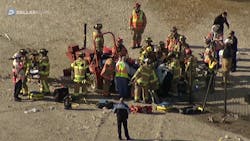TX Firefighters Assist with Pre-Hospital Amputation
Feb. 07--Francisco Palma dangled upside down, his right leg caught and mangled in the teeth of ditch digging equipment resembling a giant chainsaw. Only his head and shoulders touched the ground.
A trencher caught the pant leg of the 46-year-old construction worker last week. It flipped him over and nearly severed his leg.
Frisco firefighters reached Palma just five minutes after the accident, but they couldn't free him. His leg would need to be amputated right there, amidst the dirt and rocks.
Luckily, there was a plan for that.
"It's like trying to get a symphony together," Dr. Mark Gamber, an emergency room doctor at Medical City Plano, later said.
"To have all of these processes come together, especially the first time you put it into play, I think that's one of the things that's special."
Always prepared
It's during the "golden hour" following a traumatic injury that a life is most likely to be saved.
Firefighters called Gamber on their way to the accident scene. He summoned trauma surgeon Al West, who arrived by helicopter 41 minutes after the accident.
He carried a black plastic tool box that held everything he would need to free Palma: a saw, scissors, clamps, dressings. This was the first time in his 20 years operating on trauma patients that he wouldn't have a sterile operating room.
Firefighters gave Palma blood that arrived in the helicopter with West and then surgery began.
Six months earlier, Medical City Plano formed the "pre-hospital amputation team" after Collin County firefighters expressed a need. Frisco deputy fire chief Scott Vetterick said the idea formed while he was talking to Gamber about the potential for patients to become trapped because of all the ongoing construction. The county's population has doubled to more than 1 million since 2000, bringing more people -- and with them, construction and accidents.
Without the team in place, Palma would have waited at least another hour as either a Dallas team headed to Frisco or Medical City Plano figured out what to do. Could a doctor even leave the hospital to operate? What tools were needed? How would the doctor get there? How would the doctor work in the field?
"And in that hour, it's very possible he could have bled to death," West said.
Firefighters held Palma's body so he wouldn't fall after the amputation and West began cutting above the right knee. The machine had already partially severed the leg and West cut the remaining tissue. Palma's left leg was also injured -- with a fracture and muscle damage, tests would later show.
Firefighters treated Palma with Ketamine, a drug Frisco has used for the past 18 months in trauma cases. It sedates and controls pain without dropping patients' blood pressure. Gamber said the military has used the drug and first responders have begun using it for serious injuries.
"He was comfortable," West said. "If he ever remembers, it won't be a normal memory."
Ten minutes after West arrived, Palma was free, said Vetterick, a former flight medic, who supervised the 20 or so firefighters working with the doctors near Main Street and Independence Parkway.
Firefighters lowered Palma onto a backboard and used a tourniquet to stop the bleeding on the amputated leg. He could gently move his left foot -- a good sign, West said.
Then, the helicopter flew Palma to Medical City Plano where he went right into the emergency room.
Thumbs up
Palma remains in critical condition this week and is using a ventilator to breathe under heavy sedation, West said. He can open his eyes, respond to commands and give a "thumbs up" sign.
Sara Acosta, Palma's wife, has sat by his side since the accident. Acosta said he is a dedicated father who likes to play soccer with their children. The family lives in McKinney.
Palma has worked in construction for nearly a decade, Acosta said, but his family doesn't know whether he'll be able to do that kind of work again.
Acosta thanked doctors for saving her husband's life.
"They did their job well," she said.
Palma had several planned trips to the operating room to rid his wounds of any possible bacteria. Doctors won't close his wounds for another week or two.
"The battle now is infection because of the dirt ground into his wounds," West said. "We are being very aggressive about going in there just to clean up."
West said Palma will remain in the hospital for at least six weeks before heading to either in-patient rehab or home in a wheelchair. He'll continue to visit the hospital for checkups.
Palma won't be able to put any weight on his remaining leg for at least three months. Slowly, West said, he will be able to use crutches and then a walker with a prosthetic leg.
His recovery will depend on his insurance, too, West said. The family has set up a GoFundMe to help with expenses.
There's a 75 percent chance, West said, Palma will be able to walk well with a prosthesis and without a walker.
As for the amputation team, West said he doesn't expect to see another patient like Palma for two to three years.
"Hopefully, we don't do it again," Vetterick said. "But if we do, it's good to know it worked."
The toolbox is packed and ready to go.
Staff Writer Julieta Chiquillo contributed to this report.
___ (c)2018 The Dallas Morning News Visit The Dallas Morning News at www.dallasnews.com Distributed by Tribune Content Agency, LLC.
